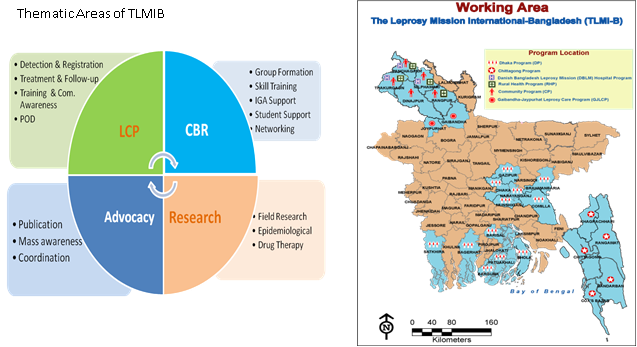About Us - Program wise activities

The Leprosy Mission in Bangladesh (TLMI-B)
The Leprosy Mission International (TLMIB) has a long history of working in Bangladesh, particularly in leprosy services, dated back from 1926 when it first started supporting the leprosy work in Chandraghona in Chittagong Hill Tracts. The organisation is a prime member of the National Leprosy Elimination Program (NLEP) of the ministry of health and family welfare of government of Bangladesh. It is also a member country of the global fellowship of the leprosy mission.
The Leprosy Mission actively started supporting the national leprosy program by setting up projects since 1994. In line with the global priorities, The Leprosy Mission looks forward to the organisational goal : Leprosy Defeated; Life Transformed. In the current Bangladesh TLM strategy, the organisation targets the people affected by leprosy. The services for them are all free. The organisation further targets the people suffering from physical disabilities and also those discriminated social class, who are neglected by communities.
TLMIiB is
implementing 22 projects under 6 programs across 26
districts in 6 divisions of Bangladesh, with a total of 470
staff strenghts. It is working on the arena of leprosy
control, commun ity
base rehabilitation, advocacy and research. The projects
provided services with wide array ranging from leprosy case
identification, treatment, leprosy complication and
disability management, community mobilization and
empowerment, CBR and SER, advocacy. The Leprosy Mission in
2014 also supported the National Tuberculosis program (NTP)
through two of its TB projects.
ity
base rehabilitation, advocacy and research. The projects
provided services with wide array ranging from leprosy case
identification, treatment, leprosy complication and
disability management, community mobilization and
empowerment, CBR and SER, advocacy. The Leprosy Mission in
2014 also supported the National Tuberculosis program (NTP)
through two of its TB projects.
Link - Implementing Programs and Project of TLMiB